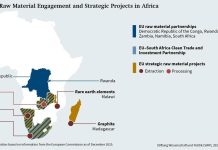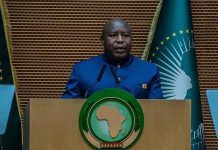Africa-Press – Lesotho. Climate change has thrust a challenge to embrace and adopt innovative farming methods, adaptation to enhance and climate-resilient methods have become alternatives to
crop-livestock farming for good production yields. Food and Agriculture Organisation (FAO) describes climate-smart agriculture as an approach that helps guide actions to transform agri-food
systems towards green and climate-resilient practices. The sustainable development goals (SDGs) goal no. 1 aspires to end poverty “in all its forms” and goal no. 2 is about ending hunger in the world
by 2030. It calls on the world leaders to “End hunger, achieve food security and improved nutrition and promote sustainable agriculture”. Also, SDGs no. 6 (clean water and sanitation), no. 13 (climate action),
no. 14 (life below water) and no.15 (life on land) also aim to address the healthy environment which is likely to result in good farming. It also recognises “the interlinkages, among supporting sustainable
agriculture and empowering small farmers, promoting gender equality, ending rural poverty, ensuring healthy lifestyles, tackling climate change…” Last week Informative Newspaper caught up with
the International Fund for Agricultural Development (IFAD) Country Director for Botswana, Lesotho and Namibia, East and Southern Africa Division Dr Phillip
Baumgartner to discuss the projects through which his organisation is supporting in Lesotho. IFAD is a specialised United Nations (UN)’s agency, and is an
international financial institution. Its work involves investing in rural people, empowering them to enhance food security, improve nutrition as well improving the households’ income as its overall objectives.
Dr Baumgartner said their funded local project Wool and Mohair Promotion Project (WAMPP) sets out to promote climate-smart and rehabilitate the land. He
said it has invested in climate rangeland management which assists farmers with the weather information to improve their planning. IFAD Country Director said they work with the grazing associations
jointly with the Ministry of Forestry, Range and Soil Conservation. He however warned that there is a lack of up to date policy on Rangeland which he stressed
should recognise the grazing associations as they work closely with the community leaders. Reviewing these regulations, Dr Baumgartener argued they should have
their status recognised. The Country Director also added that capacity building is vital; he said WAMPP has trained about 30 of the grazing associations and 90
will be capacitated in the next 15 months. The recently launched, National Soil and Water Conservation Policy 2021 “With respect to land degradation, Lesotho faces a serious
problem of increasing environmental degradation. Major factors in environmental degradation are reduced soil cover due to poor agricultural practices and
overgrazing, depletion of soil organic matter and gully formation mainly resulting from impacts of land-based developments. These result in declining crop yields and rangeland carrying capacity, siltation of dams and streams, and
impacts on biodiversity; that adversely affect the national socio-economic wellbeing and development. ” Dr Baumgartener said about 40 metric tonnes of soil are washed
away by water arguing that is a huge economic cost to the country. He emphasized the need for improved fodder and good grazing land in Lesotho. He further highlighted that resilient farming needs to be practised by
climate-smart people who engage in smart planning, farming and harvesting. The Country Director said IFAD has engaged with the Participatory Integrated Climate Services for Agriculture (PICSA), the method which he
says help farmers to plan to farm, assess risks of certain crops against others. He said about 30 000 households have received training on this method.
He said their organisation supports communities in proper feeding and handling of animals as well as improving fodder production to scale it up for easy access.
Healthy animals are able to resist climate change adding that they are also investing in the breeding project citing those of Quthing and Mokhotlong breeding centres.
The breeding centres he said have been instrumental as they have produced improved genetics which in turn help farmers to have improved breeding and stock size, this is despite the challenges of overgrazing and drought that
had dealt a blow to animals in some parts of the country. The Government of Lesotho entered into a partnership with IFAD in December 1980 on what was termed the Agricultural and Marketing Credit Project.
IFAD has supported 11 projects that injecting north of 92.11 million US dollars approximately to M1.4 billion. Of the 11 projects financed by IFAD, eight have been closed, two are
ongoing and one is starting in 2022. The Country Director said there is a new project, termed wool and mohair projects (WAMPS) which is in the pipeline, adding that once all necessary
requirements have been met, IFAD will approve it and hope it will be launched next year as they are working with the government. He said the project will
look into traceability and digitisation of the wool and mohair sector to promote the standards and align with the demands of the global markets. Traceability
will allow Lesotho to maintain production standards for its produce. So farmers can sell wool that meets requirements of the end market and consumers, gaining
a better price for their wool. Dr Baumgartener said all projects which IFAD had sponsored have benefited over 340 000 households a figure which he said when multiplied by
four sums (an average number of a family per previous national statistics data) around 1.4 million just over half of the population. Asked if he is comfortable with the investment IFAD has made in the
country, he said “We have achieved a lot since we started working in Lesotho and IFAD will continue to work with the government and other stakeholders to
invest in rural people”. Describing the partnerships IFAD entered into, he said they rely on trust, good planning and execution. He said the government of Lesotho should further explore innovative financing and learn from the successes of the previous projects going forward.
For More News And Analysis About Lesotho Follow Africa-Press






